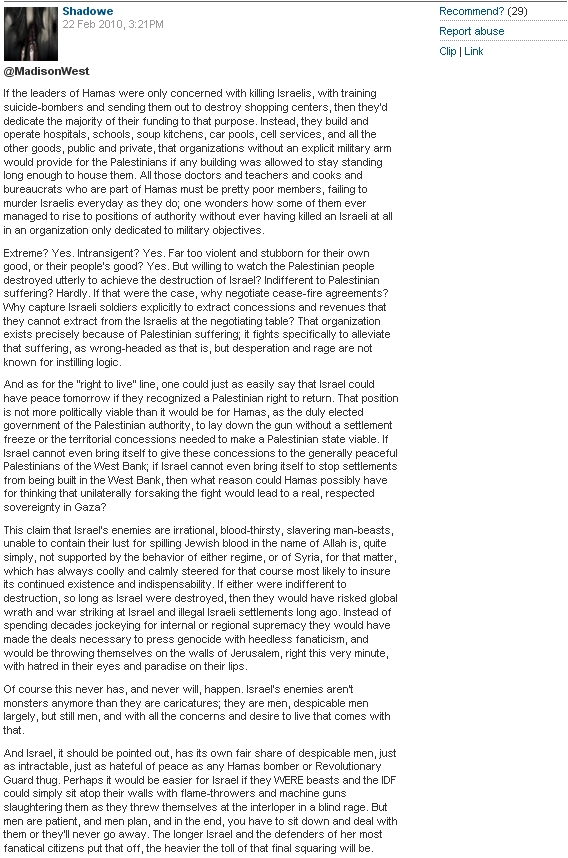Alan Rusbridger, the Guardian’s chief editor from 1995-2015, published a column in the Independent (“The horrors of 7 October did not happen in a vacuum – so why has it become unsayable?“, Feb. 17). Leaving aside the curious fact that he didn’t publish it at his former outlet, the premise of his piece, that what he’s saying is “unsayable”, is patently absurd, as there have been no shortage of columns in the British media – particularly at the Guardian – making that case.
But, beyond the canard, his hatred of Israel – no surprise to anyone who followed our blog during his reign at the Guardian – is expressed in the opening sentence, when he asks, “Have there been times in recent weeks when, in thinking of Israel, you’ve wanted to swear?”, which is a statement, rather than a question.
He continues by uncritically citing the Gaza casualty count provided by the Hams-run health ministry.
Having killed as many as 28,000 people (around the population of Chichester) in retaliation for the atrocities of 7 October, Israel is preparing to launch an assault on Rafah, an area of Gaza currently sheltering around 1.5 million men, women and children.
First, Hamas does not distinguish between combatants and non-combatants. Nor does it account for those Palestinians killed by misfired rockets – which accounts for up to 20% of all Gaza rocket fire. Further, it’s been reported that roughly 11,000 of those 28,000 (reportedly) killed are Hamas fighters. This ratio of civilian to combatant casualties, argued renowned military historian Andrew Roberts, is exceptionally low in the history of urban warfare – especially considering Hamas’s human shield policy, which intentionally places fighters, weapons and and military infrastructure in civilian areas.
Further, John Spencer, Chair of Urban Warfare Studies at the Modern War Institute at West Point, has argued that “Israel has implemented more measures to prevent civilian casualties than any other military in the history of war”, even though such measures increase the risk to their own soldiers. Such measures, he adds, have never been undertaken by the US Army in similar situations.
Rusbridger continues:
What, in this context, is sayable? More than half the countries in the UN called for a ceasefire in Gaza in the month or so after 7 October. So did the Pope, and the Archbishop of Canterbury. But eight Labour frontbenchers were effectively sacked for demanding the same thing on 15 November.
Such early pleas for a ceasefire – that is, the complete and permanent unconditional cessation of hostilities – would have left Hamas, the perpetrator of the worst antisemitic massacre since the Holocaust, whose leaders vowed to carry-out Oct. 7-style massacres again and again, in power, with their military in tact. It’s notable that neither Rusbridger, nor the throngs of anti-Israel protesters who’ve demonstrated in London each week since the war began, have demanded that Hamas surrender and that the hostages be released, which would have achieved a true and lasting ceasefire, and saved thousands of lives.
Now, Rusbridger gets to the heart of his argument:
The secretary general of the United Nations, António Guterres, told the UN Security Council back in late October that the attacks by Hamas “did not happen in a vacuum” – and was promptly told by Israel that he should resign. It was unsayable. But does any reasonable person consider that you can begin to fathom the horrific events of 7 October without considering the 56 years of history that preceded it?
Of course, the “56 years of history that preceded” Oct. 7 includes multiple Israeli peace offers which were rejected by Palestinian leaders, the 2nd Intifada, a campaign of Palestinian violence targeting Israeli civilians which killed over 1,000 Israelis, and which began during the height of the peace process, as well as Israel’s unilateral withdrawal from Gaza in 2005. But, that’s not the history Rusbridger wants to talk about. Though he doesn’t specify what precisely he’s referring to, his “unsayable” point appears to be that Hamas’s massacre was at least somewhat understandable given Israel’s ‘oppression’ of the Palestinians.
He then goes further, making an argument by citing others who share his views.
Just before Christmas, [NY Times journalist Ezra] Klein mused on how his conversations to date had changed his thinking about Israel. “I am not certain, and, in fact, somewhat doubt, that Israel makes Jewish people safer,” he said.
“I’m a Jewish person. Do I feel safer? Do I feel like there’s less antisemitism in the world right now because of what is happening there, or does it seem to me that there’s a huge upsurge of antisemitism, and that even Jews in places that are not Israel are vulnerable to what happens in Israel? … It is both potentially, in some circumstances, a place that could protect us. But it is also, in other circumstances, a place that could endanger us.”
Rusbridger is saying – two days after the CST issued their 2023 antisemitic incident report showing 4,103 antisemitic incidents took place in the UK in 2023, the highest number of annual incidents (by far) since the charity started keeping track in 1984 – that it’s arguable that the actions of the Jewish state causes antisemitism abroad, as opposed to the ideology and actions of the perpetrators themselves.
This line of thinking, codified as antisemitic by the IHRA Working Definition, is not only unoriginal, but represents something akin to conventional wisdom by the antisemitism deniers and apologists which frequent the pages of the outlet he used to lead.
If you want to understand how indescribably malevolent this argument is, and no less so simply because it was uttered by a Jewish journalist, simply imagine someone saying that the actions of Islamist regimes abroad cause attacks by white Christians against Muslims in the US or UK. There is literally no scenario in which those of Rusbridger’s political orientation would ever blame Muslim behavior for Islamophobic incidents committed by Christians or Jews.
Then, after a brief moral throat clearing on the need to condemn ‘real’ antisemitism, writing that “There is…real and vile antisemitism. There really are bigots who will believe any nutjob conspiracy theory about Israel. Condemn them, suspend them, marginalise them”, Rusbridger, paraphrasing comments by a former advisor to Shimon Peres, writes the following:
the current Israeli government is one which includes criminals, lunatics, extremists and despots who have no interest in a peaceful solution to the Israel-Palestine question. The horrors of 7 October most certainly did not happen in a vacuum.
It’s not “anti-Israel” to say so, nor is it “anti-Zionist”, let alone antisemitic – but how casually those three are sometimes elided.
First, let’s recall that Hamas reportedly began planning their Oct. 7 massacre before the current government was elected: that is, when centrist Yair Lapid was prime minister.
Moreover, Rusbridger’s inability to understand what was made crystal clear on Oct. 7, that Hamas buys into a conspiratorial antisemitic ideology which sees Jews qua Jews are a global threat and doesn’t distinguish between Israeli ‘doves’ and ‘hawks’, between left and right, between men and women or even between adults and children, illustrates the moral rot at the Guardian that we’ve been documenting for the past 15 years.
Though he’s no longer chief editor, his views on antisemitism, Israel and the Palestinians are de rigueur at the institution he led for 20 years, an outlet whose coverage of the region since that dark Shabbat day four months ago, when terrorist death squads sadistically murdered, raped, tortured and mutilated innocent men, women and children, has been effectively pro-Hamas.
Rusbridger reminds us that the answer to a question we posed in a recent post about the profound moral failure by pro-Palestinian campaigners and commentators in the aftermath of Oct. 7 (“Can there be a decent pro-Palestinian left?”) is…perhaps one day, but, sadly, that day appears to be a long way off.






Blatant, shameful victim-blaming
No, it didn’t happen in a vacuum. It’s part and parcel of a much wider defamation campaign against the Jewish State and Jews.